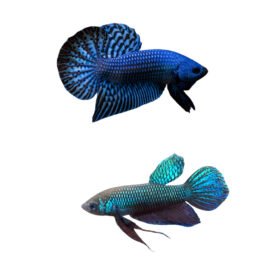Breeding and Reproduction, Aquatic Science and Research, Conservation and Preservation, MAA Blog
The Fascinating World of Betta Hybridization: Potential, Challenges, and Ethical Considerations


Betta hybridization is generating a buzz within the aquarium hobbyist community, especially with the potential creation of hybrids like those between Betta splendens, Betta imbellis, Betta mahachaiensis, and Betta smaragdina. This development opens up discussions about the broader potential for hybridization within the Betta genus. This trend of hybrid compatibility within the splendens complex suggests Betta splendens could also breed with Betta siamorientalis and Betta stiktos.
Exploring the Potential for Betta Hybridization
Hybridization, in theory, could span across all Betta species, but it often necessitates artificial intervention due to significant differences in courtship behaviors, mating rituals, and rearing methods. Betta splendens, for instance, exhibits distinct behaviors and environmental preferences that can pose challenges to natural hybridization. Despite these challenges, the creation of new Betta hybrids is an exciting prospect for enthusiasts and breeders who seek unique fish varieties.
Betta enthusiasts are driven by the potential to create hybrids with unique colorations, fin shapes, and behaviors not found in pure species. This endeavor, however, comes with responsibilities and ethical considerations that must be meticulously managed to ensure the health and integrity of these species.
The Challenges of Betta Hybridization
One of the primary challenges is the differing methods of courtship and mating among Betta species. Betta splendens, known for its intricate courtship display involving flaring gills and spreading fins, may not naturally align with the behaviors of other species like Betta imbellis or Betta mahachaiensis. This incompatibility can hinder natural hybridization without human intervention.
Additionally, Betta species have different rearing methods. Betta splendens are aggressive and territorial, complicating the breeding process. Ensuring the safety and well-being of parent fish and resulting fry requires careful planning and management. Artificial breeding techniques, such as controlled environments and manual fertilization, are often necessary to overcome these challenges and achieve successful hybridization.
Ethical Considerations in Hybrid Fish Breeding
Ethical considerations are paramount in hybrid fish breeding. Transparency is crucial; hybrids must be accurately identified and sold as what they truly are. Mislabeling hybrids, such as selling a cross between Betta splendens and Betta imbellis under the generic term “Betta splendens,” is unethical and risks the integrity of gene pools, especially for rarer species.
Responsible breeders must ensure hybrids are clearly labeled and sold with accurate information about parent species and potential genetic traits. This helps maintain the integrity of Betta populations and prevents unintended genetic consequences and the loss of pure genetic lines.
The Importance of Ethical Breeding Practices
Ethical breeding extends beyond accurate labeling. The welfare of fish involved in breeding must be prioritized. Hybridization efforts should focus on the health and well-being of both parent fish and offspring, including providing appropriate environments, nutrition, and care.
Breeders should also consider the long-term impacts of hybridization on the Betta hobby and the aquarium trade. While creating new hybrids can be rewarding, it’s essential to enhance the diversity and enjoyment of the hobby while maintaining the ecological and genetic integrity of Betta species.
Maintaining Species Integrity and Preventing Genetic Contamination
Maintaining the integrity of Betta species and preventing genetic contamination is vital. Introducing hybrids into breeding programs without proper identification can lead to unintended genetic consequences and loss of pure lines. This is particularly critical for endangered or genetically limited species.
Breeders must take measures to ensure hybrids do not mix unintentionally with pure species. This includes keeping meticulous records and managing breeding programs to maintain species integrity. By doing so, breeders can enjoy the benefits of Betta hybridization while safeguarding the future of these beautiful fish.
Innovations in Betta Hybridization Techniques
Advancements in breeding techniques have facilitated Betta hybridization. Artificial breeding environments and manual fertilization have made it possible to overcome natural barriers and produce hybrids with desired traits. These techniques enable breeders to experiment with new combinations and create unique hybrids that captivate hobbyists.
However, these innovations must be used responsibly. Ethical considerations should guide the use of advanced techniques to ensure the welfare of the fish and the preservation of genetic diversity. By adhering to ethical practices, breeders can contribute to the sustainable development of the Betta hybridization hobby.
The Role of Technology in Hybrid Betta Breeding
Technology plays a significant role in hybrid Betta breeding. Advanced genetic tools and breeding technologies allow breeders to create and maintain detailed records of breeding programs, ensuring accurate identification and tracking of hybrids. These tools also aid in monitoring the health and well-being of fish, contributing to more successful breeding outcomes.
With the help of technology, breeders can achieve greater precision in their hybridization efforts. However, the use of technology should always be balanced with ethical considerations to ensure responsible breeding practices. By leveraging technology responsibly, breeders can enhance the Betta hybridization hobby while preserving species integrity.
Educational Initiatives for Responsible Betta Hybridization
Educational initiatives are essential for promoting responsible Betta hybridization. Hobbyists and breeders should be informed about the ethical considerations and best practices in hybrid fish breeding. Workshops, online courses, and informational resources can help disseminate knowledge and encourage ethical breeding practices.
By participating in educational initiatives, hobbyists and breeders can learn about the potential impacts of hybridization on Betta species and the importance of maintaining genetic diversity. These initiatives foster a community of responsible breeders who prioritize the welfare of fish and the integrity of species.
Conclusion
The potential for hybridization within the Betta genus presents exciting opportunities for aquarium enthusiasts and breeders. However, it is imperative to approach this endeavor with responsibility and ethical considerations to ensure the preservation of species integrity and the prevention of genetic contamination. Transparency in the sale and identification of hybrid fish is crucial to maintaining healthy and diverse aquatic ecosystems. By adhering to ethical breeding practices, hobbyists can enjoy the benefits of Betta hybridization while safeguarding the future of these beautiful and fascinating fish.
FAQs
What are the potential benefits of Betta hybridization?
Betta hybridization offers the potential to create fish with unique colorations, fin shapes, and behaviors that are not found in pure species. This can enhance the diversity and enjoyment of the aquarium hobby.
What are the challenges of Betta hybridization?
Challenges include differing courtship and mating behaviors, varying rearing methods, and the need for artificial breeding techniques to overcome natural barriers.
Why is transparency important in hybrid fish breeding?
Transparency ensures that hybrids are accurately identified and sold, maintaining the integrity of gene pools and preventing unintended genetic consequences.
How can breeders ensure ethical practices in hybridization?
Breeders can ensure ethical practices by accurately labeling hybrids, providing appropriate care and environments, and considering the long-term impacts of hybridization.
What role does technology play in Betta hybridization?
Technology facilitates precise breeding, detailed record-keeping, and health monitoring, contributing to successful hybridization efforts while maintaining ethical standards.
What educational initiatives can support responsible Betta hybridization?
Workshops, online courses, and informational resources can help hobbyists and breeders learn about ethical considerations and best practices in hybrid fish breeding.

Our Social Media Channels:
Facebook | Instagram | Telegram | Youtube | Twitter | Posts |

